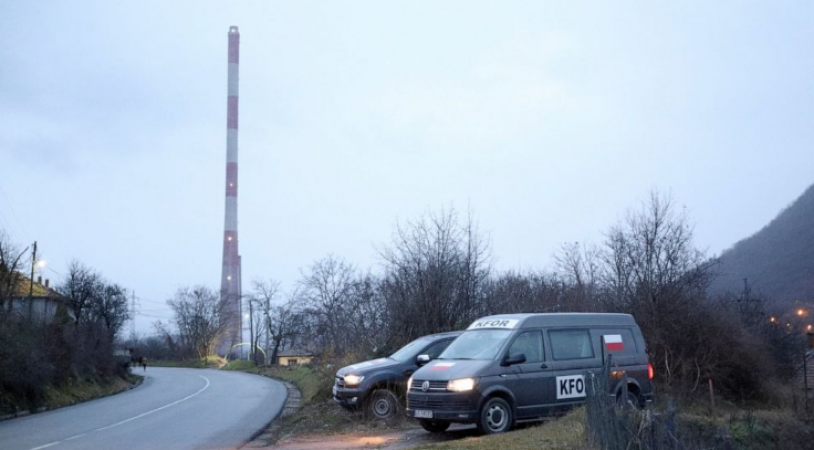
PRISTINA, Kosovo - Tension ran high in northern Kosovo on Sunday amid the rumble of gunfire and explosions. The Serbian president issued a warning that his country's military was ready to defend its "homeland" if peace was not achieved.
A day after Serbian President Aleksandar Vucic said he would ask the NATO-led peacekeeping force in Kosovo to allow the deployment of 1,000 Serb troops in the Serb-populated north of Kosovo, claiming they are being harassed there Yes, the roads of the former province of Serbia. Kosovo, which declared independence in 2008, is blocked off with large vehicles and trucks.
The roadblocks were put in place despite Kosovo Serb protests over the postponement of the 18 December municipal election, which the Serbs claim was done in response to the recent arrest of a former Kosovo Serb police officer.
Also Read: US authorities have detained a suspect in the fatal 1988 Pan Am explosion
By delaying local elections, Kosovo was able to ease tensions, according to German Foreign Minister Annalena Bierbock on Sunday.
Recent Serbian rhetoric had the opposite effect. Sending Serbian troops to Kosovo is not even a suggestion. There are also the most recent attacks on EULEX, he added.
After a meeting of Serbia's top security body on Sunday, Vucic said he would do everything in his power to keep the peace, but said the army was ready to protect minority Serbs in Kosovo.
Also Read: Nationwide demonstrations against Peru's political crisis are ongoing
"We have taken steps to protect our country," Vucic told Serbian state television RTS. He said, "The National Security Council has followed my instructions. I am very proud of our police officers and soldiers. We will do our best to maintain peace before we get their orders."
Prime Minister of Kosovo Albin Kurti accused Belgrade of trying to weaken Kosovo. He said Serbia is seeking to end EU-mediated talks on normalizing bilateral relations and take it to the UN Security Council, where it hopes to get support from China and Russia.
Kurti urged Serbs in Kosovo to "distance themselves from the criminal groups and Vucic's regime that are funding them and seeking war."
In accordance with the EULEX Rule of Law mission, an EULEX reconnaissance patrol was killed by a stun grenade overnight. No one was hurt or anything was broken.
EULEX, which has 134 police officers from Poland, Italy and Lithuania stationed in the north, urged Kosovo institutions to "bring the perpetrators to justice" and urged "those responsible to refrain from further provocative actions".
Top EU official Josep Borrell declared that the EU "will not tolerate attacks on EULEX or the use of violent, criminal acts in the North."
"Groups of Kosovo Serbs must immediately remove the barricades," he tweeted. "Peace must return; all actors must refrain from escalating tensions."
In addition to closing the two border crossings to all traffic and pedestrians, Kosovo officials were also observing unidentified masked men at Serb barricades blocking major roads leading to the Serbian border.
On Sunday, Kosovar Albanian police were more visible in areas with diverse populations, and more international police and troops were also present.
The verbal conflict between Serbia and Kosovo has taken a turn for the worse recently.
Vucic announced on Saturday that he would formally ask the NATO-led KFOR mission in Kosovo for permission to deploy Serbian forces in northern Kosovo, although he acknowledged that the request was unlikely to be approved.
Serbian officials claim that a UN resolution officially ending their bloody campaign against separatists in Kosovo, who make up the majority in 1999, has allowed the withdrawal of some 1,000 Serb troops. To end the conflict and force Serbian troops out of Kosovo, which declared independence in 2008, NATO bombed Serbia.
In order to authorize Serb troops to enter Kosovo, NATO-led peacekeepers who have been stationed there since the 1998–1999 conflict would need to give their approval. This is highly improbable as doing so would essentially mean giving control of the security of the Serb-populated northern areas of Kosovo to the Serbian military, which would increase tensions in the region.
Also Read: An American student goes missing in France while studying
"We want to avoid conflict. We want peace and progress, but we will respond to aggression with all our might," Albin Kurti, Prime Minister of Kosovo, wrote on social media.
Kurti advised the United States and the European Union to "punish" Serbia for directing violence in an attempt to "destabilize Kosovo".
In the north, there has been considerable unrest this week, leading to elections originally scheduled for 18 December. In an attempt to diffuse the situation, they have now been postponed till April 23.
The election was required because ethnic Serb representatives left their positions in November in opposition to the Kosovo government's decision to outlaw Serbia-issued licence plates for motor vehicles.
Since Kosovo declared its independence from Serbia, tensions have been building despite efforts by EU and US officials to diffuse the situation. Serbia has refused to recognise Kosovo as a state, supported by its allies Russia and China.
Both Serbia and Kosovo want to join the EU, but Brussels has warned that in order to be admitted, they must settle their dispute and resume normal relations.
The NATO-led mission in Kosovo, according to NATO Secretary-General Jens Stoltenberg, "remains vigilant."